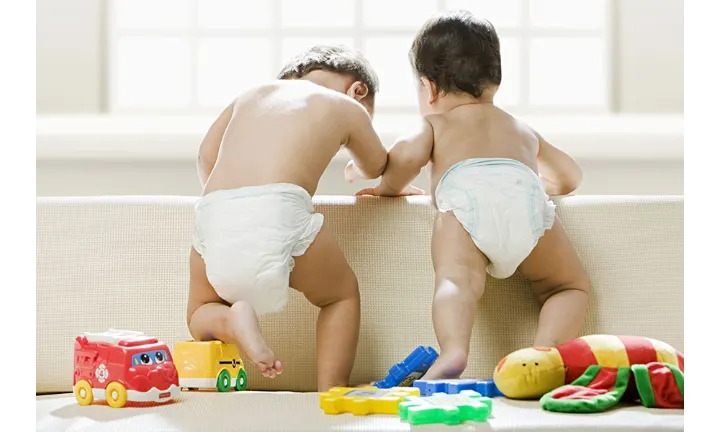Tips on When & How to Start Potty Training For Your Child
Planning to potty train your little one? Well, let us tell you that this daunting task requires a lot of patience. Right from understanding when to start potty training your baby, the right potty-training age to how to potty train, there are many such questions that a parent thinks of. For most of them, waiting until their child shows signs of readiness fits the plan. As potty training is a major milestone that your little one achieves, having the right knowledge can make this parenting task easier for you. Read on to discover some of the signs that your little one is getting ready to start potty training, how to prepare your child for potty training, and how to start potty training.
Signs of Readiness for Potty Training
When it comes to potty training, as a parent you need to keep in mind that there isn't one ‘right age’ for your question - when to start potty training. Rather it’s a slow process that calls for your little one to develop a complex set of skills. As you are closer to your baby and know him better, you might sense when the time is right. Which is why instead of looking for the right potty-training age, you should watch out for signs which signify that your little one is getting ready to start potty training.
Read the Signs
If you look closely, your child will tell you with his behaviour that he's probably ready to begin:
Does he have bowel movements at a fairly predictable time? Does he let you know through words or behaviour that he's aware that he's having one?
Can he pull down and pull up his pants?
Does he show an interest in the bathroom and what other people do in it?
Can he walk over to and sit down on the potty by himself?
Has he started saying 'No!' to you? Does he like to have at least some of his toys in certain special places? This shows that he's interested in controlling things in his environment.
Does he know what 'wet' and 'dry' mean?
Does he respond to praise and wants to please you?
If your answer is 'yes' to most of these questions, he is may be ready to begin.
When Will Your Child Be Ready for Potty Training?
Even though potty training can be started at an early age, studies have shown that kids who begin potty training before 18 months aren't completely trained. Rather, they are fully trained only until after the age of four. On the other hand, children who don't start training until around the age of two are more likely to be fully potty trained before they turn three. Girls tend to be ready to potty train a little earlier than boys, but the readiness signs for both boys and girls are the same. Read more about signs your toddler is ready for potty-training and when to start potty-training
Things You Can Do to Prepare Your Toddler for Potty Training
Even before you start noticing the signs of readiness, there are steps you can take to prepare your child for potty training and help make the experience successful. Tackling some of these pre-potty-training steps will help familiarise your child with the concept of the potty before training begins. It may also make the process less scary and confusing for your child — which in turn may make potty training your little one easier for you.
Here's what you can do to prepare your child for potty training:
Get a potty chair to keep around the house, explaining in simple terms what it's for and how it works. When you're choosing your child's potty seat, perhaps you can let your child pick the one he likes to help him get more excited about the potty.
Use words like “pee-pee” and “poop” to familiarise your child with what's happening when you're using the toilet or when you're changing a dirty diaper.
As your child gets a bit older and closer to actual potty training (and you've spotted some of the readiness signs mentioned above), show him where the poop from his diaper goes, and let him put it in his potty or flush it down the toilet.
If possible, let your child watch when other family members of the same sex use the toilet.
Once you've seen most of the signs of readiness mentioned above, it's time to start potty training. It's a good idea to start with bowel training, which is focusing on potty training when your child is pooping or about to poop. Peeing usually happens during pooping, so young children often have a hard time telling the difference. Once bowel training is established and your child is typically successfully pooping in his potty chair, most children — especially girls — will begin to relate the pooping with peeing and then can start to understand the difference between them. Because you'll start potty training with a focus on bowel training, boys usually learn to pee sitting down. However, they can gradually learn to do it standing up. Imitating an older sibling of the same gender or maybe Dad can help him learn. There are also books you could refer to that show how boys can pee standing up. If you have started preparing your child for potty training in advance, you probably may have a potty chair at home.
How to Start Potty Training
Once you've seen most of the signs of readiness mentioned above, it's time to start potty training.
It's a good idea to start with bowel training, which is focusing on potty training when your child is pooping or about to poop. Peeing usually happens during pooping, so young children often have a hard time telling the difference. Once bowel training is established and your child is typically successfully pooping in her potty chair, most children — especially girls — will begin to relate the pooping with peeing and then can start to understand the difference between them.
Because you'll start potty training with a focus on bowel training, boys usually learn to pee sitting down. However, they can gradually learn to do it standing up. Imitating an older sibling of the same gender or maybe Dad can help him learn. There are also books you could refer to that show how boys can pee standing up.
If you started preparing your child for potty training in advance, you probably already have a potty chair at home.
The First Steps of Potty Training
Once your child is familiar with “his” potty chair, these are some steps you can take to start potty training:
Let your child sit on his potty fully clothed while you talk to him about the potty and what it's for.
Once your child is sitting on the potty by himself without being prompted, you can try getting him to sit there with his diaper off. Don't make your child sit on the potty if he doesn't want to.
When he's comfortable with that routine, try changing his diaper while he's on the potty. If he pooped, show him how you drop the poop into the potty chair or the toilet.
Introduce the habit of handwashing every time your child gets off the potty, even if he didn't pee or poop.
An important thing to remember is to keep the experience positive and praise your child for all his potty successes. If you can make potty training fun, your little one will have an easier time making this transition.
Nighttime Potty Training
In comparison to the daytime, nighttime potty training takes a little longer. It’s because of the combination of sound sleep and small bladder, most children under the age of seven wet or soil their pants easily. But on the other hand, there are children between the age of five to seven who are able to stay dry at night.
To make sure that your nighttime potty training is a success, here are a few things you can do:
Opt for disposable sheets
Give your baby a limited amount of liquids before bedtime
Teach them to go to the washroom whenever they wake up at the night
Make sure the way towards the bathroom area is well-lit, making your child feel safe and comfortable
How to Handle Potty Accidents
When you start potty training your baby, accidents are going to occur as it’s a usual part of the entire process. Being a parent, you need to learn a few ways to handle potty accidents with ease. Here are a few tips that might help you out:
Be Patient and Stay Calm:
Instead of scolding your little one, you should empathise with them. Using encouraging words can also boost their morale and help them not to commit the same accident again.
Be Prepared:
You should always keep a change of underpants, especially if your little one is going to school or to a childcare centre.
Read more about potty trained toddlers and accidents.
When to Delay Potty Training
At this point, you need to trust your instincts. As a parent, you would know exactly when to start potty training. There might be instances wherein, even if your toddler is showing signs of being ready for potty training, you might want to delay this training. Here are some situations:
If your child is sick
If you’re in the middle of travelling
Around the birth of a sibling
If your child is transitioning from the crib to a bed
If you’re moving to a new home
When to Consult A Doctor
If your little one is showing signs of potty training but is unable to do it, then you must consult with your child’s doctor. He can provide you with the right guidance and detect if there’s an underlying problem. This can help you get the right treatment at the earliest.
The Bottom Line
The journey from when to start potty training to how to potty train your child is full of surprises. It surely would be a great learning experience for your little one as he develops new skills. In this journey, there are a few potty accidents that might occur. But here your patience and preparedness would play a huge role. So, go and train your little one as he takes his first step towards independent living.


